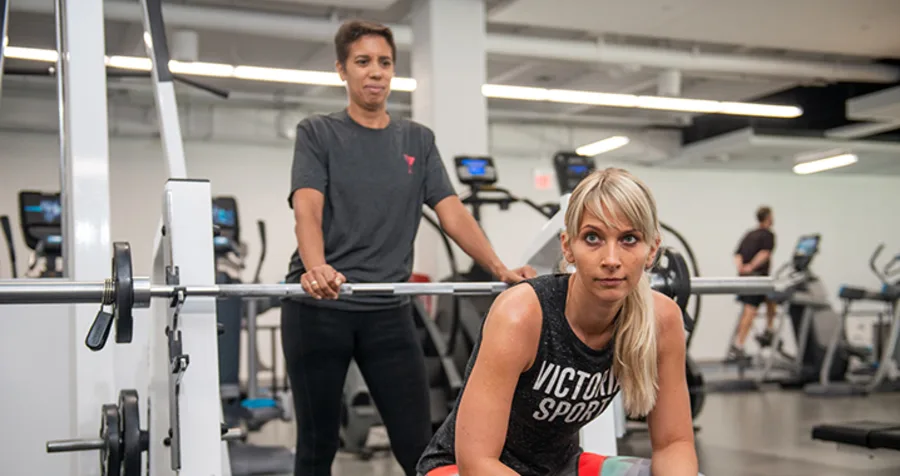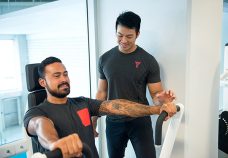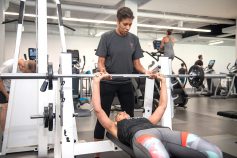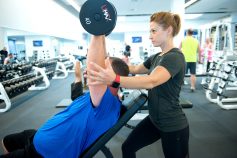How to bench press: barbell versus dumbbell versus machine

The seemingly simple bench press is a classic gym move meant to strengthen your upper body. At first glance, it may seem like a no-brainer, but there are several important considerations to make before you grab the dumbbells and head for the bench. This week, we asked Kyle — a personal trainer and group fitness instructor at the Cooper Koo YMCA — to break down the differences between bench presses done with a barbell, dumbbells, and on a machine.
The bench press is a tried-and-true exercise us personal trainers rely on to help people target their pectoral muscles (A.K.A., your chest). Many of my clients are either looking to tone up or bulk out, and the bench press guarantees results in both departments.
The question is: which of the many adaptations of this strength-and-muscle-building staple is right for you?
- The machine bench press

The machine bench press gives control making it one of the safest variations.
Sitting upright with your spine against the backrest and your feet planted on the floor, you'll push the handles forward, away from your body, then return them to the starting point in front of your shoulders.
Pros
The machine controls much of the movement for you, making this perhaps the safest version of the bench press for both the experienced and beginner lifter. True, you decide when and how fast to push, but you don't need to worry about one of your dumbbells tracking too far to one side, or whether your barbell is staying parallel to the floor. The machine also makes it somewhat easier for you to maintain good posture, thanks to the adjustable seat and back.
Cons
This version of the lift is the least “functional”; it won’t really help support more practical ways of moving as much as the other variations. Relying on the machine doesn’t challenge your balance, stability, or coordination very much.
Is it right for you?
Give the machine a try if you've never done a bench press before. It's the best option to help you safely build strength and get used to the motions before you kick it up a notch with a barbell or dumbbells.
- The barbell bench press

The barbell bench press allows the user to lift heavier weight making it a great option for those looking to bulk up.
Lying on a bench with your feet flat on the floor and a barbell horizontal across your chest, you’ll begin to press the weight away from you, towards the ceiling, then lower it back down until it's just above your chest.
Pros
Because you're lying down with your feet on the ground to stabilize you, and you're putting all your force behind one single weight (as opposed to two separate dumbbells), you'll be able to lift your heaviest with this version. That makes the barbell bench press the move for you if you're looking to build some serious strength and size.
Cons
If you're stronger on one side than the other, it's going to show. The barbell bench press forces you to lift equally with both arms; if you don't, your barbell is going to get lifted higher or faster on one side than the other. Novice lifters or those without top-notch coordination could wind up making their strength imbalances worse, or even hurting themselves.
Is it right for you?
I recommend the barbell bench press to people with intermediate lifting experience, fairly balanced strength, and decent coordination. It's the perfect exercise for you if your goal is to bulk up your chest.
- The dumbbell bench press

Dumbbell bench pressing helps you work on stabilizing muscles and your core.
This move has you doing the same thing as the barbell bench press, except you swap the single barbell out for a dumbbell in each hand.
Pros
Splitting the weight in two forces you to work harder to stabilize. You'll get a bonus core workout from trying to balance each weight and drive them towards the ceiling at the same time, instead of having the barbell do some of that stabilization work for you.
Cons
When it comes to the bench press, dumbbells' strengths are also their weaknesses. You need pretty good balance and coordination to tackle this one, because, again, you don't have a barbell or machine to help you stabilize. For the same reason, you probably won't be able to lift quite as much weight, making it less than ideal for people looking to bulk up.
Is it right for you?
This is the exercise for you if you're trying to tone and tighten, rather than build size, though you'll certainly still build strength with this gem. To avoid injury, you'll also want to make sure you have some lifting experience and pretty good coordination before giving this one a shot.
Need help figuring out which variation you should try? A personal trainer can guide you towards the right fit that will keep you safe and on track towards your goals.
Kyle is a graduate of Durham College's Fitness and Health Promotion program and is currently finishing a degree in Rec and Leisure studies at Brock University. He's a CanFitPro- and YMCA-certified Personal Trainer and Fitness Instructor who's been training and teaching for ten years. Kyle is currently the Director of Adult Programs at the Cooper Koo Family YMCA, where he teaches Bootcamp, Kettlebell, CycleFit, and MuscleFit classes weekly. See him in action in the YMCA's Sweat For Good video, and check out his Y story on the blog.










